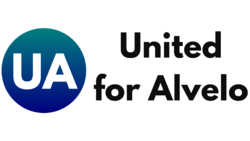United for Alvelo 1723 General Election Campaign (Nouvelle Alexandrie)
  Campaign logo(s) for the 1723 United for Alvelo general election campaign. | |
| Campaign Year | 1723 |
|---|---|
| Campaign Name |
Somos Más y No Tenemos Miedo There's More of Us, And We Aren't Afraid |
| Party Name | United for Alvelo |
| Party Leader | Party Leader |
| Campaign Slogan | Pablo Alvelo Nieves |
| Campaign Launch Date | 1723 AN |
| Headquarters | Potosí, Santander |
| Political Alignment |
|
| Seats | 97 seats (Santander) |
| Key Surrogates | |
| Amount of Events Held | Template:Notable Campaign Events |
| Regions Visited | Santander |
The United for Alvelo 1723 general election campaign, also known as the "Somos Más y No Tenemos Miedo" (There's More of Us, And We Aren't Afraid) campaign, marks a pivotal moment in the political landscape of Nouvelle Alexandrie. Officially inaugurated on XX.XX.1723 AN through the 1723 UfA Opening Day Rally and Fair, the campaign serves as the electoral arm of the United for Alvelo political group. Spearheaded by Pablo Alvelo Nieves, the campaign aims to capture seats for the party in the Santander region during the 1723 general elections.
The campaign is rooted in a blend of left-leaning economic policy, liberal social values, and a strong populist undertone, as encapsulated in its distinct platform. Its headquarters are situated in Potosí, Santander, a locale that significantly resonates with the party's grassroots ethos and the home of its leader, Pablo Alvelo Nieves. As the party fields 97 candidates for every seat Santander sends to the Cortes Federales of Nouvelle Alexandrie, it employs a robust network of key surrogates, including notable figures such as Martina Gonzaga and Phillippe Roi, who amplify its message. This article delves into the political alignment, organizational structure, and strategic initiatives that form the bedrock of the United for Alvelo 1723 general election campaign.
Political Alignment
- Economic Policy (-0.6): While the UfA leans towards left-wing policies with the Unified Social Credit Policy and emphasis on workers' rights, the party also has some centrist policies like zero-interest loans for local businesses. This lands it at -0.6 on the economic policy scale.
- Social Policy (-0.8): The UfA platform strongly emphasizes liberal values such as universal healthcare and education but also includes some moderate points like the civic service requirement, placing it at -0.8.
- Geographic Tendency (-0.7): With a focus on urban renewal and public transport, the party is skewed towards urban areas, but its broader social policies could have a more neutral or even rural appeal. A -0.7 rating reflects this.
- Cultural Tendency (-0.9): The UfA has a strong populist tilt, as seen in its grassroots beginnings and its leader Pablo Alvelo Nieves' close relationship with his community. Therefore, it rates at -0.9.
Background
The formation and rise of the United for Alvelo (UfA) political group is inextricably linked with its founding leader, Pablo Alvelo Nieves. Nieves, who has been a mainstay in Nouvelle Alexandrien politics since his election as the first independent Mayor of Potosí, Santander, in 1715 AN, utilized his grassroots popularity and administrative acumen as political capital for a transition to federal politics. In the 1718 general elections, despite missing the ballot filing deadline, a write-in campaign organized by local supporters and donors succeeded in electing him as an independent Deputy of the Federal Assembly from Santander. As a deputy, Nieves has been an unwavering advocate for workers' rights, educational investments, and improvements in public transport.
Recognizing the growing need for an organized political movement to institutionalize and further his reformist agenda, Nieves founded the United for Alvelo (UfA) party in Santander in 1722 AN. The formation of the UfA was a strategic move, aimed not only at consolidating support for Nieves' legislative projects but also at preparing a robust campaign for his re-election bid in the 1723 general elections. The UfA immediately began to organize its party infrastructure, launching grassroots campaigns, town hall meetings, and policy discussions to engage citizens.
In anticipation of the upcoming 1723 general elections, the UfA undertook initiatives to expand its reach and contest all seats available for Santander in the Federal Assembly. Sensing a shift in the political winds, several candidates who had initially planned to run as independents were swayed by the UfA's rapidly growing appeal and threw their lot in with the party. These strategic alliances boosted the UfA’s standing, offering it a more comprehensive slate of candidates and enhancing its credibility as a mainstream political movement.
The party seized this moment to articulate a unique ideological stance. The UfA developed a policy framework known as the Unified Social Credit Policy (USCP). This policy aims to establish a social credit system that provides financial supplements to households with below-average income, ensuring basic economic stability, called the Social Credit Dividend. Additionally, the USCP proposes creating a government-controlled fund that would finance community projects, thereby stimulating local economies and providing jobs. A particularly novel aspect of the USCP is the introduction of a civil service requirement for all New Alexandrians when they turn 18, for at least one (1) year. This mandates that all citizens, upon reaching 18 years of age, are to serve a period in either military, medical, or other forms of government or community service, in return for certain educational, economic, and/or housing benefits.